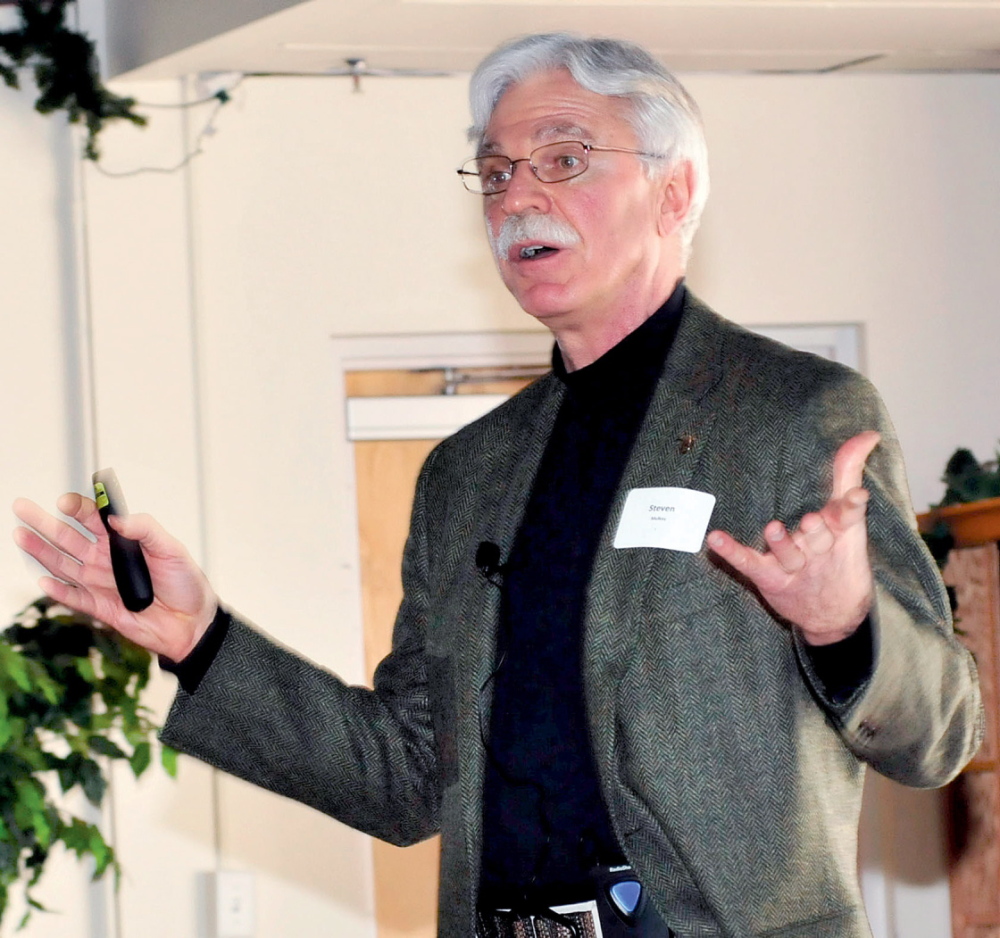WATERVILLE — “Maine’s economy is not looking too good,” Stephen Mulkey, president of Unity College, told a subdued crowd of about 40 people Wednesday afternoon.
Maine’s maple sugar, forestry and lobster industries are all threatened by the effects of global warming, Mulkey said, which will dramatically change the state’s economy and landscape over the next three decades.
Mulkey, whose vision of climate change is so bleak that his former students used to refer to him by the moniker Dr. Doom, said warming temperatures and more destructive weather patterns can no longer be ignored.
“It’s catastrophic,” Mulkey said, using a visual presentation loaded with graphs scientific study excerpts to make his point. “That’s not hyperbole. That’s not me shouting fire in a theater.”
The talk was one in a monthly series sponsored by the Mid-Maine Global Forum in the REM Center on Waterville’s Main Street.
In 2012, a year after Mulkey became president, Unity College became the first in the nation to divest from investment in fossil fuels. Under his leadership, the college was also recognized for building TerraHaus, the first college residence hall in the country to meet Passive House energy standards.
On a national level, Mulkey said, “environmental and resource limitations will cause economic growth to cease by mid-century.”
But it didn’t take long for Mulkey to shift gears Wednesday from a depressing view of unstoppable changes to ideas about how to deal with them.
Maine’s unique challenges — which he said include an inadequate and deteriorating physical infrastructure, a weak manufacturing base and low pay for workers — are matched by the state’s strengths, which include an abundant supply of fresh water, manageable forests and a growing sector of young, entrepreneurial farmers who are dedicated to sustainable practices.
Mulkey said the sweeping changes that will be wrought by global warming will bring opportunities, both for the state and for higher education institutions like Unity College, which has been a leader in promoting sustainability.
“Adaptation will be a multi-billion dollar opportunity,” Mulkey said. “That, I see as an incredible opportunity for the economy of Maine.”
As warmer temperatures creep north, many of the species that live in Maine will be forced farther north and many species from farther south will enter the region.
The key, Mulkey said, is to begin responding to those changes now, so that they will be less painful in the future.
For example, he said, coastal areas flooding will force massive relocations in the state that will require a shift of the physical infrastructure, a task that civil engineers should be planning for now.
The logging industry should weigh whether it will be less expensive to shift to products made from encroaching tree species or whether it will be less expensive to try to manage the forest in a way that will prevent those other species from taking over.
“Forget maple sugar,” he said. “Forget maple syrup. They will be driven off the top of the state by the end of this century.”
And the lobster industry should be figuring out how to transition to other species when coastal temperatures get too warm.
Today’s college graduates, he said, should know how to help those industries meet those challenges.
Mulkey said higher education in the state needs to undergo a dramatic change to meet that growing need.
He said all schools should begin teaching sustainable science in an effort to prepare students to weigh the various trade-offs that happen when reacting to environmental changes.
Matt Hongoltz-Hetling — 861-9287 mhhetling@centralmaine.com Twitter: @hh_matt
Send questions/comments to the editors.



Success. Please wait for the page to reload. If the page does not reload within 5 seconds, please refresh the page.
Enter your email and password to access comments.
Hi, to comment on stories you must . This profile is in addition to your subscription and website login.
Already have a commenting profile? .
Invalid username/password.
Please check your email to confirm and complete your registration.
Only subscribers are eligible to post comments. Please subscribe or login first for digital access. Here’s why.
Use the form below to reset your password. When you've submitted your account email, we will send an email with a reset code.